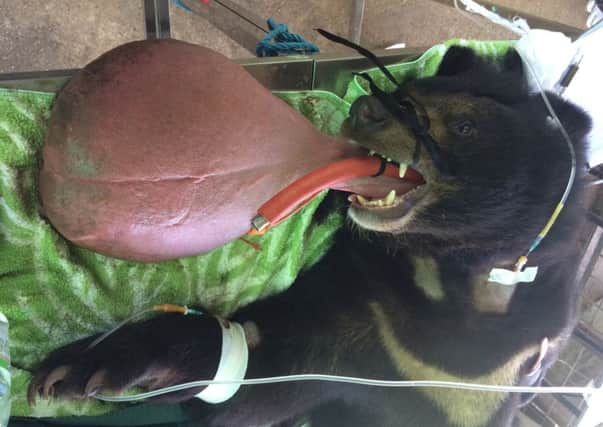Scots vet helps save bear with 3kg elephantitis tongue


The expert team carried out a four-hour operation in soaring temperatures to amputate the animal’s tongue, which weighed in at a staggering 3kg.
Now the 18-month-old male Asiatic black bear is back playing with his brother in the monastery where they have been living since being saved from wildlife traffickers last year.
Advertisement
Hide AdAdvertisement
Hide AdThe youngsters – named Nyan Htoo, meaning bright or smart, and Kan Htoo, meaning lucky – had been destined for illegal sale to the bile industry in China when monks stepped in to save them.
Soon after their rescue, it was discovered Nyan Htoo was suffering from an unknown disease that caused his tongue to become severely enlarged.
Vets first operated on the ailing bear in 2016 in an attempt to remove the bloated flesh, but the swelling recurred and got steadily worse.
By this summer the disease was seriously affecting Nyan Htoo’s quality of life, with his gigantic tongue dragged around on the ground and suffering repeated injuries.
He was often seen resting his head on the bars of his cage to support the extra weight.
Animal welfare expert and veterinary surgeon Heather Bacon, from the University of Edinburgh’s Royal (Dick) School of Veterinary Studies, worked with Caroline Nelson, a veterinary nurse at the Animals Asia Bear Rescue Centre in Vietnam, to perform the life-changing procedure.
“This was an opportunity for us to use our veterinary and animal welfare expertise to make a significant difference for a bear and the people who care for him,” Ms Bacon said.
“Thanks to the enthusiasm and compassion of all involved in this uniquely collaborative project we have been able to make a tangible improvement in the quality of Nyan Htoo’s life, and hope to continue our work in Myanmar to promote improvements in animal welfare and veterinary training.”
Advertisement
Hide AdAdvertisement
Hide AdThe team believe the swelling may have been caused by a mosquito-transmitted infection called elephantiasis, which is common in people in Myanmar but has never previously been reported in bears.
They say the young bear is recovering well and should go on to live a virtually normal life.
Caroline Nelson added: “This was a really unusual medical condition, never before seen in any species of bear, but we weren’t about to give up on Nyan Htoo.
“We’re delighted that we’ve been able to improve his quality of life.
“Now he will be able to eat much more comfortably, sleep in more natural positions and move more freely for the rest of his life.”
Chinese traditional medicines made from bear bile, which is taken repeatedly from incisions in the creatures’ gall bladders, are believed to cure eye and liver ailments.
Animal welfare campaigners claim there could be 10,000 Asiatic black bears – also known as moon bears due to their crescent-shaped chest markings – being held for bile production in China.